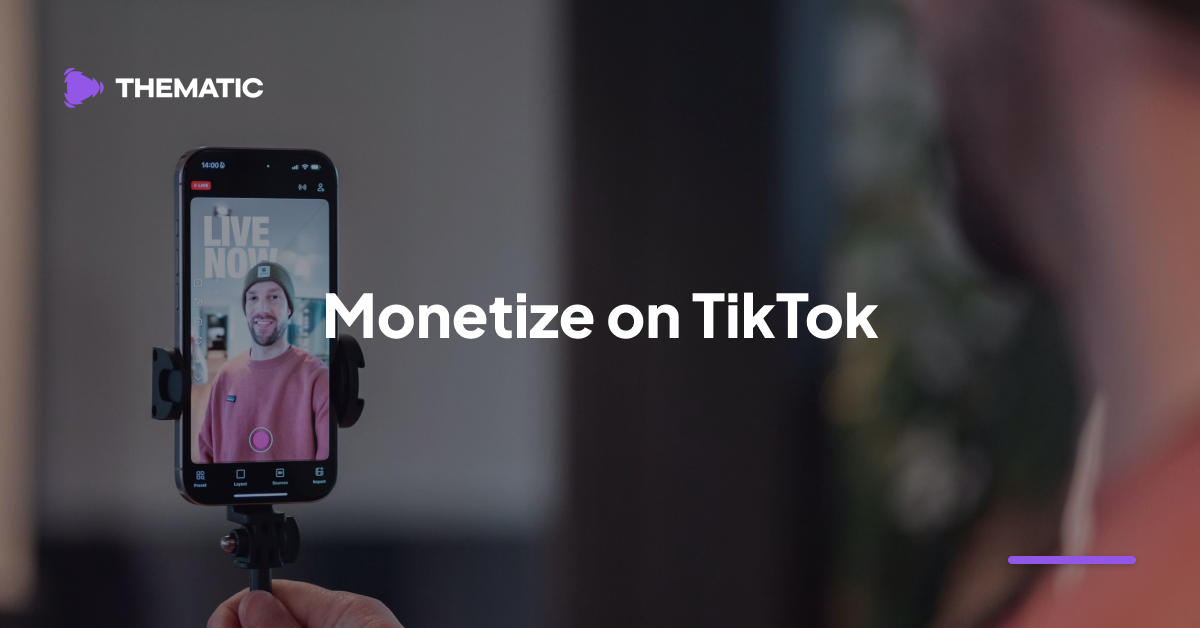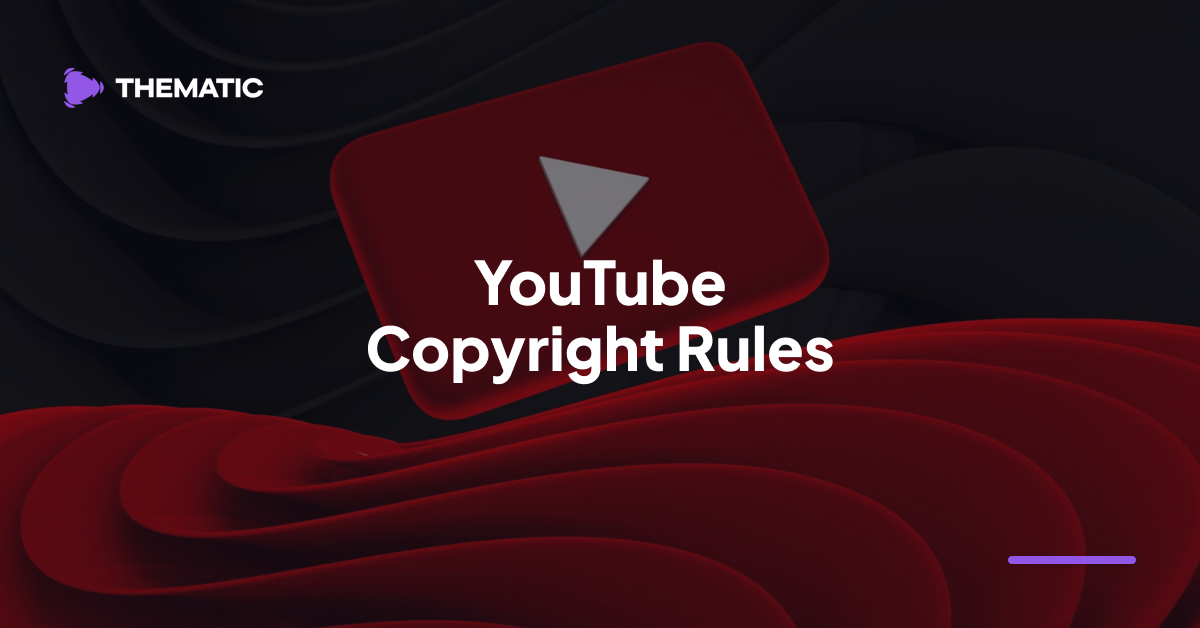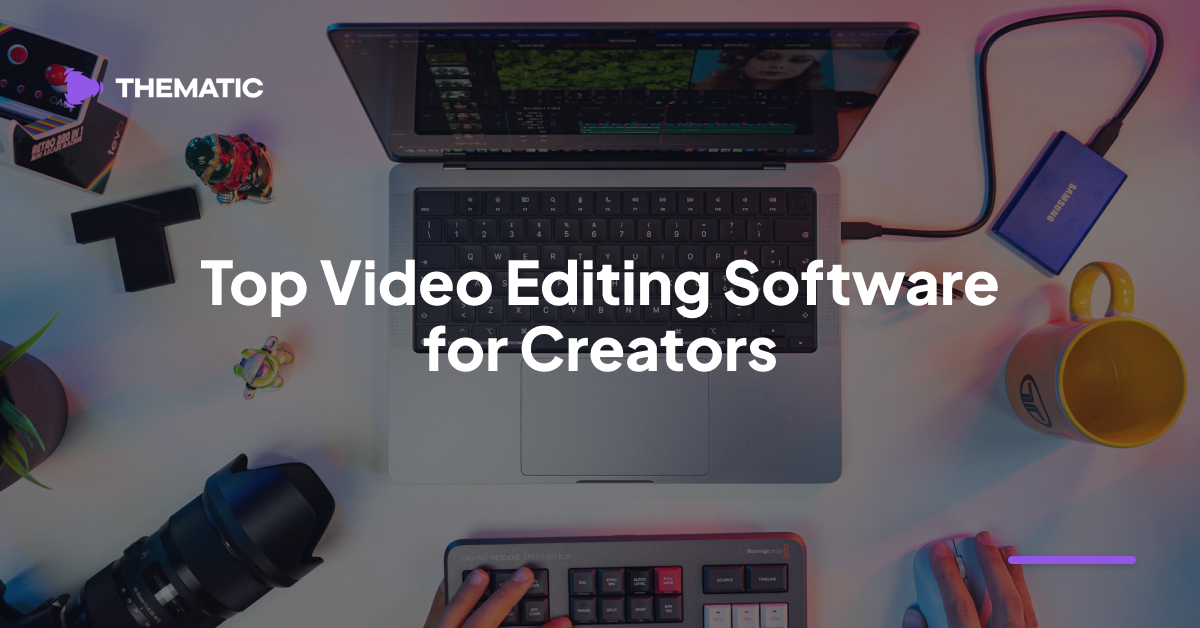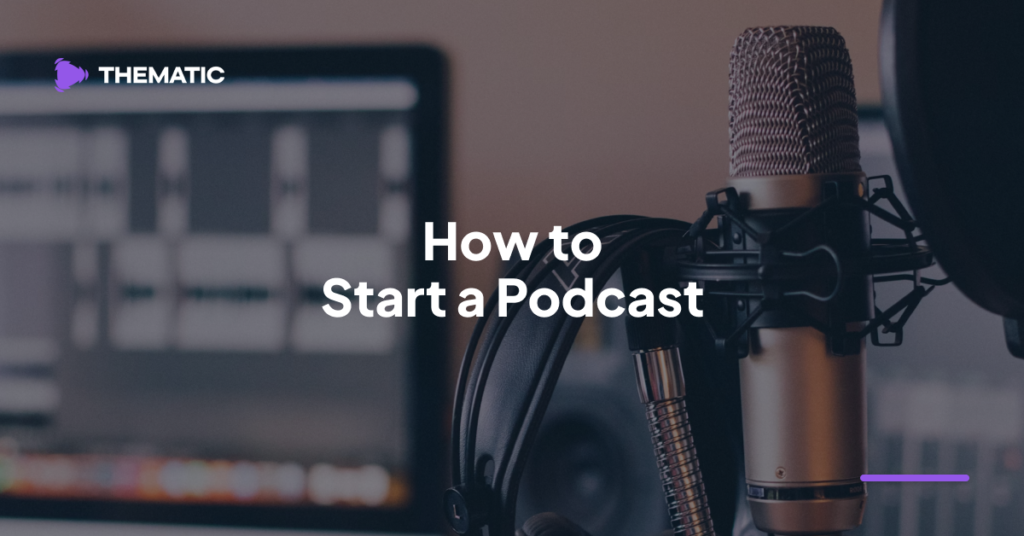
Ready to start a podcast? You’re in the right place. Starting a podcast in 2026 is easier than you think, and you don’t need expensive equipment or technical expertise to get started.
Podcasting has exploded in popularity over the past few years, with over 460 million podcast listeners worldwide. Whether you want to share your expertise, interview interesting people, build a personal brand, or simply have conversations about topics you love, podcasting is one of the best ways to build an audience and connect with people who share your interests.
The barriers to entry have never been lower. With a basic microphone, free software, and a clear idea, you can launch a professional-sounding podcast from your home and reach listeners around the globe.
In this beginner-friendly guide, you’ll learn:
- How to choose your podcast topic and format
- What equipment you actually need (hint: less than you think)
- How to record and edit your episodes
- Where to publish your podcast so people can find it
- Simple ways to promote your show and grow your audience
- How to add music legally without copyright issues
- When and how to start making money from your podcast
By the end of this guide, you’ll be ready to launch your first episode with confidence. No overwhelm, no confusion – just clear, actionable steps.
Let’s get started. 🎙️
Table of Contents
- Choose Your Podcast Topic & Format
- Get the Right Equipment
- Record & Edit Your Podcast
- Publish Your Podcast
- Promote & Grow Your Audience
- Make Money from Your Podcast
- Stay Legal with Music & Guests
- Common Questions Answered
Step 1: Choose Your Podcast Topic & Format
Pick a Topic You Can Talk About Consistently
The first step to start a podcast is choosing what your show will be about. The best topics combine your genuine interest with what people want to hear.
Here’s how to find your topic:
- List things you enjoy talking about. What topics do you constantly read about or discuss with friends? What do people ask you for advice about?
- Check if others are interested. Search for these topics on Apple Podcasts or Spotify. Existing podcasts mean there’s an audience – that’s a good sign, not a bad one.
- Pick something specific. Instead of “fitness,” try “running for beginners” or “home workouts for busy moms.” Specific topics help you stand out and attract dedicated listeners.
- Test your idea. Can you easily think of 10-15 episode topics? If yes, you probably have a sustainable podcast idea. If you struggle to come up with episodes, your topic might be too narrow or not aligned with your interests.
Popular podcast categories that work well:
- True crime and mystery
- Business and entrepreneurship
- Health and wellness
- Personal finance
- Comedy and entertainment
- Technology
- Self-improvement
- Pop culture and reviews
✅ Pro Tip: Choose a topic you can talk about week after week without running out of ideas. If you struggle to think of 10 episode ideas, your topic might be too narrow.
Choose Your Podcast Format
- Solo Show: Just you talking. Great if you like having full control and don’t want to coordinate schedules.
- Interview Show: You chat with different guests. Good for networking and bringing in diverse perspectives.
- Co-Hosted Show: You and a partner host together. Creates natural conversation and makes recording more fun.
- Narrative/Storytelling: Scripted episodes with production. More work but very engaging for listeners.
Start with whatever feels most natural. You can always change your format later as you figure out what works best for you and your audience.
Name Your Podcast
Keep it short (2-4 words), easy to spell, and hint at what your podcast is about. Avoid being too clever if it sacrifices clarity – you want people to immediately understand your topic.
Good examples:
- “The Daily” (daily news)
- “How I Built This” (business stories)
- “Crime Junkie” (true crime)
Search Apple Podcasts and Spotify to make sure your name isn’t already taken before you commit.
Step 2: Get the Right Equipment for Podcasting
Good news: You don’t need to spend a fortune to have a great sounding podcast. You can start a podcast for under $100 with high quality audio.
Best Microphones for Beginners
Budget-Friendly ($50-100):
- Audio-Technica ATR2100x-USB ($79): Great sound, plugs into your computer
- Samson Q2U ($60): Affordable and reliable
- Blue Yeti ($100): Very popular, easy to use
Start with a USB microphone. You can upgrade later if needed.
Set Up Your Recording Space
Record in a quiet, small room. Add blankets or pillows to reduce echo. Turn off noisy appliances. That’s it.
✅ Pro Tip: Test your space by recording 30 seconds and listening back. If you hear echo, add more soft materials.
Recording & Editing Software
Free Options:
- Audacity (Windows, Mac): Does everything you need
- GarageBand (Mac): Easy to learn, built into Apple computers
- Anchor (Mobile app): Record right from your phone
Start with free software. Upgrade later if you want more features.
Get Music for Your Podcast
Music and sound effects transform your podcast from amateur to professional. Intro music, outro music, and transition sounds create a polished, branded listening experience.
❌ However, using copyrighted music without permission can lead to serious consequences:
- Copyright strikes and takedown notices
- Legal claims and expensive fines
- Removal from podcast directories
You need copyright-safe music from licensed sources.
This is where Thematic becomes invaluable for podcasters.
Thematic offers thousands of high-quality, copyright-safe music tracks and sound effects specifically curated for content creators. Unlike generic stock music libraries, Thematic’s catalog is designed for podcasters, YouTubers, and video creators who need professional audio without the legal risk.
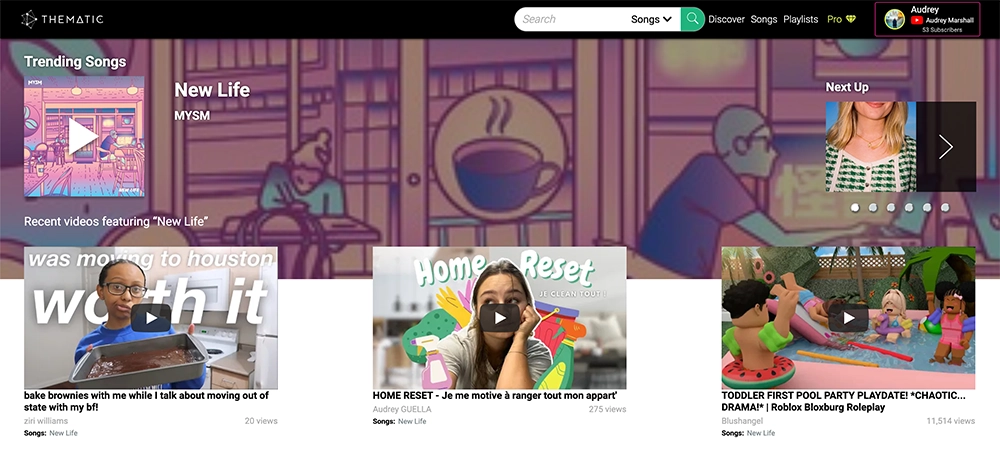
😍 Why podcasters choose Thematic:
- No copyright worries
- Affordable subscription with unlimited downloads
- Organized by mood and style
- New music added regularly
Sign up for Thematic and instantly access copyright-safe music for your podcast intro, outro, and transitions.
👉 Read our complete guide on best practices for using music in podcast episodes.
Step 3: Record & Edit Your Podcast
How to Record Your First Episode
Before you hit record:
- Write an outline with your main points (you don’t need a full script)
- Test your microphone (record 30 seconds and play it back)
- Silence your phone and eliminate distractions
- Have water nearby to avoid mouth clicks
- Sit up straight (good posture improves voice quality)
During recording:
- Speak clearly and naturally, like you’re talking to a friend
- Don’t worry about mistakes, you can edit them out later
- If you mess up, pause for 2 seconds, then restart that sentence
- Leave a few seconds of silence at the beginning and end for easier editing
✅ Pro Tip: Your first episode won’t be perfect, and that’s okay! Every successful podcaster started rough. You’ll improve with each episode.
Basic Editing Tips
Editing makes your raw recording sound polished. Don’t over-edit – some natural pauses and personality are good.
Essential edits:
- Remove long pauses – Cut silences longer than 2-3 seconds
- Delete major mistakes – Remove stumbles and excessive “um” sounds
- Balance volume – Make sure everything sounds consistent
- Add music – Include your intro music at the start and outro at the end
- Export as MP3 – Most podcast hosts want MP3 format
Most beginners spend 2-3 hours editing a 30-minute episode. It gets much faster with practice and eventually you’ll edit in near real-time.
Create Your Podcast Cover Art
Your cover art is the visual first impression. It needs to look good even at small thumbnail size on phones.
Requirements:
- Size: 3000 x 3000 pixels (square)
- Bold, readable fonts
- Simple design, avoid clutter
- Include your podcast name
Where to design:
- Canva (free templates)
- Adobe Express (free)
- Fiverr ($20-50 to hire someone)
✅ Pro Tip: Look at the top 10 podcasts in your category. Notice what their cover art has in common? Learn from success.
Step 4: Publish Your Podcast
What is Podcast Hosting?
A podcast host stores your audio files and distributes them to Apple Podcasts, Spotify, and other apps. You can’t upload directly to these platforms, you need a host first.
Best Podcast Hosts for Beginners
- Buzzsprout ($12-24/month): Beginner-friendly with great support. Free plan available to test.
- Anchor (Free): Completely free, owned by Spotify. Good for tight budgets.
- Libsyn ($5-25/month): Reliable, unlimited storage. Used by many professionals.
Start with whichever fits your budget. You can switch later if needed.
Submit to Apple Podcasts & Spotify
Apple Podcasts:
- Get your RSS feed from your host
- Go to podcasters.apple.com
- Sign in and add your RSS feed
- Wait for approval (24-48 hours)
Spotify:
- Get your RSS feed
- Go to podcasters.spotify.com
- Add your feed
- Approval usually takes a few hours
✅ Pro Tip: You only need 1-3 episodes to submit. Get your podcast live as soon as possible!
Step 5: Promote & Grow Your Audience
Getting Your First Listeners
Start with people you know:
- Tell friends and family about your new podcast
- Share on all your social media accounts
- Post in relevant Facebook groups, Reddit communities, or online forums (provide value, don’t spam)
- Email your contacts if you have an email list
Ask for reviews: At the end of each episode, ask listeners to leave a review on Apple Podcasts. Reviews significantly improve your ranking in podcast directories and help new listeners discover your show. Make it easy by explaining exactly how to leave a review.
Simple Social Media Strategies
Pick 1-2 platforms where your target audience spends time. Don’t spread yourself too thin trying to be everywhere.
Instagram:
- Share short video clips from your episodes (audiograms)
- Post quote graphics with compelling snippets
- Share behind-the-scenes content in Stories
- Use relevant hashtags like #podcast and #[yourniche]
TikTok:
- Create 15-60 second clips from your best moments
- Show your recording setup and process
- Jump on trending sounds when relevant to your topic
X (Twitter):
- Share episode announcements with brief, compelling descriptions
- Tweet interesting quotes or insights from episodes
- Engage with others in your niche
YouTube:
- Upload full episodes (even audio-only with a static image works)
- Create YouTube Shorts from episode highlights
- Benefits from YouTube’s massive search traffic
Content ideas that work:
- Episode teaser clips (30-60 seconds of the best moment)
- “Behind the mic” photos or videos
- Key takeaways or lessons from each episode
- Polls asking your audience what they want to hear next
✅ Pro Tip: Consistency matters more than perfection. Post 2-3 times per week, even if it’s just announcing new episodes. Over time, you’ll discover what resonates.
Guest on Other Podcasts
One of the fastest growth strategies is appearing as a guest on other podcasts in your niche. Their listeners already love podcast content and might become your fans too.
How to get booked:
- Make a list of 10-20 podcasts similar to yours that feature guests
- Send a friendly pitch explaining who you are and 3-5 specific topics you could discuss
- Start with smaller podcasts (under 10,000 downloads) – they’re more likely to say yes
- During the interview, focus on providing tremendous value (not just promoting your show)
- Share the episode when it goes live to thank the host and cross-promote
Step 6: Make Money from Your Podcast
You can start monetizing your podcast earlier than you think (you don’t need thousands of listeners).
Simple Ways to Monetize Podcasts
- Affiliate Marketing: Recommend products you use and earn commissions. Sign up for Amazon Associates or specific brand programs.
- Listener Support: Ask your audience to support you on Patreon or Buy Me a Coffee. Offer bonus episodes or ad-free content.
- Sponsorships: Companies pay you to mention their products. Usually need 1,000+ downloads per episode.
- Selling Your Own Products: Use your podcast to promote coaching, courses, or merchandise.
✅ Pro Tip: Start with affiliate marketing and listener support right away. Add sponsorships once you have consistent downloads.
Step 7: Stay Legal with Music & Guests
Using Music Legally
You cannot use popular songs from Spotify or Apple Music in your podcast without permission. This can get your podcast removed and cause legal trouble.
The solution: Use copyright-safe music from Thematic ✔️
Thematic provides thousands of tracks that are 100% safe for podcasts – no copyright strikes, no legal issues.
Get started with Thematic and access professional podcast music.
- Explore our Top 10 Royalty-Free Songs for Podcasts
- Browse curated podcast music playlists to find your perfect soundtrack
Guest Release Forms
If you interview people, have them sign a guest release form. This gives you permission to record and publish their voice. Find free templates online or use DocuSign for digital signatures.
✅ Pro Tip: Send the release form before recording. Most guests expect this (it’s standard practice).
FAQs about How to Start a Podcast
New to podcasting? Here are answers to the most common questions about how to start a podcast.
How long should a podcast episode be?
It depends on your content, but most podcasts are 20-60 minutes. Daily shows can be 5-15 minutes, while in-depth interviews run 45-60+ minutes. The key is keeping listeners engaged – don’t artificially stretch or cut content.
✅ Pro Tip: Look at popular podcasts in your niche to see what length your audience expects.
How often should I release episodes?
Consistency matters more than frequency. Most podcasters release weekly – it’s sustainable long-term and keeps you visible. Bi-weekly works for highly produced shows, daily for short episodes, monthly for deeply researched content.
✅ Pro Tip: Batch-record 3-4 episodes before launch to create a buffer.
What’s the minimum budget to start a podcast?
You can start a podcast for under $100: a USB microphone ($50-100), free software (Audacity/GarageBand), free hosting (Anchor), and copyright-safe music ($0-10/month on Thematic). Total: $50-110.
Do I need to be an expert?
No! Many successful podcasters learn alongside their audience. You need genuine curiosity, willingness to research, and an authentic perspective. If you interview experts, your role is asking great questions, not having all the answers.
How many listeners do I need to make money?
You can start with 100-500 engaged listeners using affiliate marketing and listener support (Patreon). Sponsorships typically need 1,000+ downloads per episode. Focus on building genuine connections over chasing numbers.
Can I start a podcast on my phone?
Yes! Use Voice Memos to record and the Anchor app for hosting and editing. Audio quality won’t be as professional, but it’s fine for testing. Once you commit, invest in a USB microphone ($50-100) to improve sound quality.
How do I come up with episode ideas?
For interviews, list 50 people you’d love to talk to. For solo shows, answer common questions in your niche (check Reddit, Quora, or Google’s “People Also Ask”), share lessons from your experience, or create series on specific topics. Keep a running list on your phone when ideas pop up.
Ready to Start a Podcast?
You now have everything you need to start a podcast today. Let’s recap the key steps:
- Choose your topic and format – Pick something you’re passionate about
- Get basic equipment – A decent USB microphone and free software
- Record and edit – Don’t overthink it, just start
- Publish to directories – Get on Apple Podcasts and Spotify
- Promote consistently – Share on social media and tell people about it
- Monetize when ready – Start with affiliate links and listener support
- Use legal music – Protect yourself with copyright-safe tracks
The most important thing? Just start.
Your first episode won’t be perfect. That’s completely okay. Every successful podcaster started exactly where you are now. The only difference is they hit record and kept going.
Don’t wait for the perfect equipment, the perfect topic, or the perfect anything. Start with what you have, learn as you go, and improve with each episode.
Get Copyright-Safe Music for Your Podcast
Don’t let music licensing hold you back. Sign up for Thematic and get instant access to thousands of podcast-ready tracks.
The world is waiting to hear what you have to say. Start a podcast today! 🎙️
We hope you enjoyed our ultimate guide on how to start a podcast ✌️If you’re looking for more creator tools and resources, visit Thematic’s Creator Toolkit for additional resources on creating content – including starting a YouTube channel, thumbnail and channel art templates, best practices, and of course, great royalty free songs to use in your videos for free with Thematic.

This Ultimate Guide on How to Start a Podcast is brought to you by Thematic Director of Partnerships, Stephanie Leyva
Stephanie Leyva sits at the intersection of music artists and content creators. As the Director of Partnerships at Thematic, Stephanie has worked extensively with the artist and creator community on the site to ensure success digitally, on the platform, and support their initiatives.
Over the past few years, she has led numerous trending music-driven influencer marketing campaigns for “Glitter” and “Supalonely (feat. Gus Dapperton” by BENEE, “Loneliness for Love” by Lovelytheband, “Checklist (feat. Chromeo)” by MAX and so many more. She’s worked alongside various labels such as Casablanca Records, Republic Records and Sony Music. Focused on empowering connections between content creators and music artists, Stephanie continues to lead the charge in innovative music discovery through social.
Stephanie is also the creator of the Bloom In Progress podcast – a podcast about personal growth, relationships and navigating life in your 20’s.

